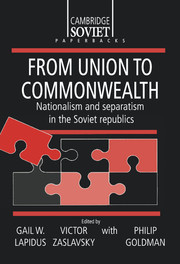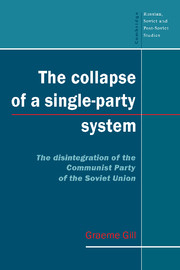From Union to Commonwealth
The collapse of the Soviet Union and the emergence of fifteen independent states on its former territory is one of the most momentous developments of the twentieth century. In From Union to Commonwealth, five leading international scholars--Leokadia Drobizheva and Galina Starovoiteva from Russia, and Gail Lapidus, Ronald Suny and Victor Zaslavsky from North America--team up to examine the forces that lay behind the rise of national movements which challenged, then destroyed, the stability and territorial integrity of the former Soviet state.
Writing from their different disciplinary perspectives--from political science, modern history and from sociology--these authors offer unique insights into the links between political structure and nationalism, finding that Soviet policies designed to eliminate national distinctiveness frequently had the unintended result of creating powerful new national identities. With the pursuit of perestroika and glasnost, such identities became potent political forces impelling the Soviet leadership to grapple with the growing tension between demands for regional sovereignity and the preservation of central economic and political control. The authors show how, in the course of this struggle, the international system often played a critical role. Non-Russian national movements sought to expand their ties to Europe or Asia even as they pursued independence from Moscow.
In the end it was the transformation of Russian national consciousness, and the emergence of a Russian state which disassociated itself from the legacy of empire, which played a decisive role in the collapse of the center. The progressive weakening of central institutions and the emergence of increasingly assertive sovereign states was accelerated by the failed coup of August 1991.
Presenting a broad and timely analysis of the national dimension of politics after perestroika, this book is essential reading for all thsoe seeking to understand the complexities underlying the demise of the Soviet state, as well as the emergence of new states actively engaged in defining their national identities at home and abroad.
- A broad up-to-date analysis of one of the most pressing problems in the contemporary Soviet Union
- Written by leading scholars in the United States, Canada and the Soviet Union
- Provides new arguments concerning the link between political structure and nationalism
Reviews & endorsements
"Of the many books that emerged from the Fourth World Congress of Soviet and East European Studies Conference heldl at Harrogate, England, in 1990, this slim volume may be the best....It should be read by everyone interested in why the Soviet Union collapsed and what lies ahead." The Russian Review
"An excellent and experienced set of authors...." Foreign Affairs
"Ideal for graduate seminars....wide-ranging essays place the events of 1985-91 and the rise of ethnonationalism conceptually and historically in the broad evolution of the Soviet Union and the often contradictory phases of policies affecting ethnic nationalities." Joel C. Moses, American Political Science Review
"Students of nationalism and of Soviet demise will find the individual contributions in this book useful as an orientation to the subject and valuable for the insights that they provide." Mark R. Beissinger, Slavic Review
Product details
September 1992Hardback
9780521417068
142 pages
229 × 152 × 13 mm
0.38kg
Available
Table of Contents
- 1. Introduction Gail Lapidus, Victor Zaslavsky and Philip Goldman
- 2. State, civil society and ethnic cultural consolidation in the USSR - roots of the national question Ronald Suny
- 3. The impact of perestroika on the national question Gail Lapidus
- 4. The evolution of separatism in Soviet society under Gorbachev Victor Zaslavsky
- 5. Perestroika and the ethnic consciousness of Russians Leokadia Drobizheva
- 6. Nationality policies in the period of perestroika: some comments from a supreme Soviet deputy Galina Starovoiteva.




